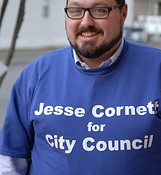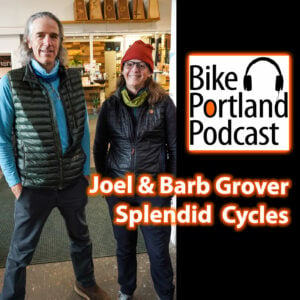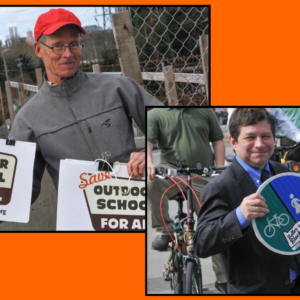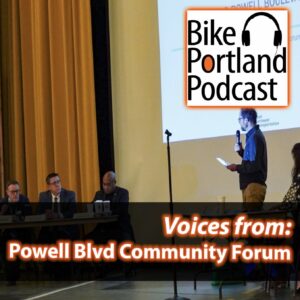Jesse Cornett is running for District 3, which encompasses (roughly) southeast Portland from the Willamette to 82nd, and I-84 to the southern border. He’s an intriguing candidate, not just because he was a “body man” for Senator Bernie Sanders and worked on his presidential campaign, but because of his long political resume here in Oregon. In 2008 he narrowly lost a race for the Oregon State Senate and in 2010 he ran for Portland City Council. I interviewed him during that campaign, so it was fun to sit down with him again today — 14 years later.
Our conversation touched on a wide range of topics, from policing to homelessness — to whether or not Portland’s goal of 25% cycling mode share by 2030 is possible.
Check out a few of our exchanges below:
If you’re on council would you support the idea of reducing space for driving so that we can put other things in its place?
“Yes. Absolutely. I think to the extent that we find opportunities to reduce lanes, we absolutely should… SE 31st Avenue is shut down right now north of Hawthorne for a block for construction. And I’ve long had this perspective — seeing this all around inner Southeast Portland where we’re building these condos — we’re shutting down entire blocks for months years. In some cases it’s been well over a year this block has been closed. I think we’ve proven as the city we don’t need that block, let’s start shutting down some of those blocks and making community spaces out of them.”
How would you respond to people who would oppose that idea due to concerns about diversion?
“I think if that were a primary concern of theirs, you would have imagined they would have been saying something over the past year and a half while this street was shut so somebody could make a profit selling condos. That’s okay? But keeping it short for community use is not okay? No, I think it is.”
How will you lead an electorate that is as split and divisive as ever?
“If you look at who’s even given me money, so far, there are some names on there that people would think, “Wow, [real estate developer] Homer Williams gave $350 to Bernie Sanders guy,’ and there are some other names that are maybe less brand names, who aren’t considered politically liberal, are supporting me despite my personal politics. And that’s because I think I’ve started to prove that I have a particular brand of collaborative politics… Let’s look at the issue of housing and homelessness. I think that we’ve created the scenario in Portland where if you dare to speak nice of somebody living in a tent and their rights and our responsibilities as a society, the homeowner who they’re five feet away from is feeling ignored, as if their concerns aren’t valued. Well for me, for that person and their wife, that [home is] probably their major lifetime investment. Do I think that the care of the person in the tent matters? Yes. Do I think the concerns of the homeowner are valid? Absolutely. It’s not one or the other. And I think that helps me bridge a political divide…”
What are the “good old days” in Portland to you? What should we be striving for as a city, to get back to, or to move forward toward?
“I don’t want to get back to anything. That’s not what I’m here to do. What I am is a bridge to the future that we want to see in the city… In terms of who we are as a city? We’ve changed, we’ve grown, diversity has shifted — I don’t want to get us back to anything. I want to help folks that liked it in 1997, to love it in 2027.”
Local nonprofit BikeLoud PDX has made it their central mission for Portland to reach 25% bicycle mode share by 2030. Do you think that’s a reasonable goal?
“I don’t think it’s my job to tell a group of volunteers what’s reasonable, but I’ll say, had the US government not set a goal to get a man on the moon within 10 years, we would have absolutely never sent somebody to the moon. You have to have goals that are lofty. If your ridership is at 8% and you get it to 10%, you can take a victory lap and probably raise some money on that. But was that going to happen already? Maybe so… Who cares if it’s unreasonable? Let’s go for it.”
Learn more about Cornett on his campaign website.
Read the full transcript here, or in the PDF embedded below. Listen above or wherever you get your podcasts. Thanks for listening!








Thanks for reading.
BikePortland has served this community with independent community journalism since 2005. We rely on subscriptions from readers like you to survive. Your financial support is vital in keeping this valuable resource alive and well.
Please subscribe today to strengthen and expand our work.
Jonathan, there’s a lot of talk on Bike Portland about traffic enforcement….whether it is good, bad or indifferent. How about you interview a police officer who is running for City Council? His name is Eli Arnold.
https://www.eliforportland.com/
Jonathan has ACAB sympathies, might be a tense inverview.
Yep I follow him and will consider an interview. Thanks!
I’m trying to think of the argument this candidate would be making as a police officer, since everyone who bikes in Portland knows the police don’t enforce any laws whatsoever – except for that one unfortunate woman who got a ticket downtown for not using the bike lane.
You could just click on the link and read what his positions are instead of disparaging him ahead of time.
It kind of helps.
So I clicked on the link and read his positions – he didn’t mention transportation at all. He addressed 3 issues -public camping (he doesn’t want to solve being homeless, more than anything it seems he wants to corral the tents/people), adding more cops (because more cops = better, I guess?), tax use accountability (?). I didn’t see anything about transportation. This is a blog/site that centers around transportation and this guy seems to either ignore or minimize the issue (or maybe convolutes it with more policing?).
I think Fred’s assessment was right – there was literally no argument about bikes, cars/traffic, and/or transportation. He doesn’t seem at all concerned about it at best and maybe hasn’t thought much about it at worst. At least that’s what I got from wasting my time reading his site…
As someone who is a veteran, college educated, had a whole career in Info Tech, who doesn’t have a substance abuse problem but has struggled with depression and ADHD and ended up homeless for a couple of years, here’s what I think most people don’t understand, many people end up homeless due to a convergence of problems and a social support system that is designed to only help people when they hit rock bottom.
If you’re living on the street, you’re living in survival mode from day to day. It took me at least a year to transition out of survival mode living. It’s taken me 5 yrs now, to fully recover from being hit by a car on my bike in a x-walk coming home from work.
“Poverty isn’t the cause of homelessness.”
According to the MIT living wage calculator, the living wage for Mult. County for a single person is $22/hr. I don’t think I’ve seen any non-tech, non-managerial bike industry job posted on BikePortland for $22/hr.
A 1st term apprentice carpenter at PNCI, can earn $27/hr, but as I know from experience, as an apprentice, you’re lucky to spend more months waiting on the dispatch list than working.
Yes, if there’s more affordable housing, that low income working class people won’t add to the homelessness problem.
But people experiencing homelessness don’t benefit from affordable housing, they need supportive housing, housing with wrap-around services to help them deal with a variety of problems such as mental, physical health, trauma, addiction, involvement with the criminal justice system. lack of job skills/work experience, etc.
‘44% of Oregon families don’t earn enough to cover bills: 4 things to know’
“Nearly half of Oregon households are unable to afford the basics, according to a new report from United Ways of the Pacific Northwest and United for ALICE.”
“The number of financially insecure households in Oregon grew by 42,000 during the first two years of the pandemic, rising by 6% between 2019 and 2021.”
Reference – https://www.registerguard.com/story/news/local/2023/05/01/report-says-nearly-half-of-oregon-households-struggle-to-afford-basics/70164805007/